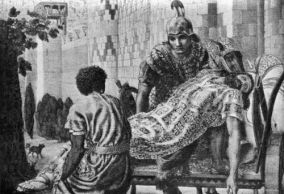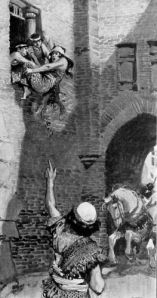When the tribes of Israel settled in Canaan, they failed to evict the resident peoples as God had commanded. This failure was a costly mistake. From then on Israel had to deal with the greatest danger posed by the culture of Canaan: idolatry. Inevitably, the religions of Canaan undermined the faith of Israel. In turning away from God, Israel suffered inescapable consequences: the Canaanites oppressed them, nations attacked them, and they fought one another.
Dangerous co-existence
In trying to co-exist with Canaanites, the people of Israel “led dangerous yet simple lives in which warlike pursuits alternated with ordinary peacetime activities.”[1] God sent judges to deliver Israel from their Canaanite enemies, but Israel never returned to God whole-heartedly. Regional judges were unable to unite the people under one authority, so the tribes functioned in a loose confederation. Lacking a central authority, tribes took matters into their own hands. People did what they wanted without the restraining influence of God’s laws (Judges 21:25).
When Deborah ruled in northern Israel, God sent word for Barak to lead an attack on the army of King Jabin and General Sisera. For twenty years Jabin’s kingdom “had harshly oppressed the children of Israel” (Judges 4:3, 6). Because Barak was reluctant to lead the Israelite forces, Deborah prophesied “there will be no glory for you…for the LORD will sell Sisera into the hand of a woman” (Judges 4:9).
Intervention
From the outset God said He would win the battle. Working through Israel’s forces with the addition of powerful weather, God defeated the Canaanites. Not a man was left in Jabin’s army–except General Sisera. He fled to the tent of Jael, a woman who lived peaceably with the Canaanites. Jael agreed to hide Sisera, and in her tent he slept, exhausted.
Then Jael, Heber’s wife, took a tent peg and took a hammer in her hand, and went softly to him (Sisera) and drove the peg into his temple, and it went down into the ground; for he was fast asleep and weary. So he died (Judges 4:21).

English: Jael Shows to Barak, Sisera Lying Dead, c. 1896-1902, by James Jacques Joseph Tissot (French, 1836-1902) or followers, gouache on board, 5 1/2 x 9 7/16 in. (14 x 24 cm), at the Jewish Museum, New York (Photo credit: Wikipedia)
Victor or Villain?
Somewhere in the story Jael switched alliances and “refused to remain neutral in this crucial conflict.”[2] As a tough, pragmatic Bedouin wife, she sided with Israel. As an ally of Israel, the general was her enemy because he was Israel’s enemy. In a lengthy poem describing the battle (Judges 5:24-27), Deborah praised Jael as most blessed among women for striking the blow that killed Sisera.
Not everyone agrees that she should be remembered with honor. Author Herbert Lockyer severely criticizes Jael with the words murder, revolting cruelty, treachery, foul, reprehensible, executioner. He states, “lacking courage, she dare not attack Sisera fairly.”[3] He adds, “Had Sisera attempted to rape Jael, and in defense of her honor she had killed him, that would have been another matter, but to kill him as an assassin kills a victim was something different.”[4] His most troubling phrase suggests condemnation: “she remains forever censurable for the cruel way she killed Sisera.?[5]
In the book Women of the Bible, Ann Spangler and Jean Syswerda take a light approach in discussing Jael. They avoid the details of Sisera’s death and emphasize that Jael was decisive, courageous, and she seized the opportunity to slay an enemy of God’s people.[6] The authors focus on Jael’s strong qualities that women can apply today. Women learn from Jael’s decisive courage to stand up against their enemies. Courageous women need to stay close to God “in the midst of the fray.”[7]
The Expositor’s Bible Commentary discusses Jael in the setting of despair and disorder that characterized the times. “Between the days of Joshua and Samuel, Israel plummeted to moral and spiritual disaster.”[8] When the tribes came together to fight a common enemy, they believed that their enemy was God’s enemy. “Wicked, murdering leaders deserved to die” [9] and killing them was a way to glorify God.
Becoming a cautious observer of history
That God allowed Jael to kill the general is undeniable. Some Bible commentators question whether He approved of the way she did it. Did He favor, like, support, agree, accept, commend, esteem, endorse, back up, sanction what she did?It’s a bigger question than a tent peg execution. Hers was not the most horrific event that occurred in the time of the Judges.
Whether God approved of the way Sisera was killed, I wouldn’t want to comment. Can the word approve be applied to anything that is unlike God? At times God accomplishes His purposes through sinful humankind.
Readers may differ on how to think about the story, but scholars agree that the three centuries under the Judges was a dark time in history. Deborah, Barak and Jael figured in one of God’s merciful interventions in Israel’s past. Reading their stories reminds me to be a cautious observer of history.—Mary Hendren
***
( For more information concerning this time period see the dark period of the Judges.)
***
[1] The Expositor’s Bible Commentary, p. 376
[2] Same source, p. 415
[3] Herbert Lockyer, All the Women of the Bible, p. 71
[4] Same source and page
[5] Same source and page
[6] Spangler and Syswerda, Women of the Bible, p. 115
[7] Same source, p. 121
[8] The Expositor’s Bible Commentary, Vol. 3, p. 376
[9] Same source, p. 380




